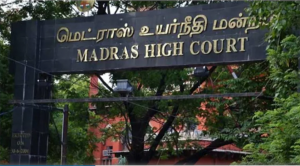 The Hon’ble High Court of Madras vide its order dated 18.01.2024 in the matter of M/s VSM Weaves India Private Limited Vs. The Assistant Commissioner (ST), Tiruchengode in W.P. Nos. 960, 964 and 968 of 2024 And W.M.P. Nos. 1013, 1008, 1005 of 2024, held that as long as the conditions are fulfilled, a refund claim cannot be rejected on the ground that the debit were not made. It was also held that the refund claim for zero rated exports does not disentitle the petitioner from claiming a refund for unutilized ITC.
The Hon’ble High Court of Madras vide its order dated 18.01.2024 in the matter of M/s VSM Weaves India Private Limited Vs. The Assistant Commissioner (ST), Tiruchengode in W.P. Nos. 960, 964 and 968 of 2024 And W.M.P. Nos. 1013, 1008, 1005 of 2024, held that as long as the conditions are fulfilled, a refund claim cannot be rejected on the ground that the debit were not made. It was also held that the refund claim for zero rated exports does not disentitle the petitioner from claiming a refund for unutilized ITC.
The Petitioner filed the writ petitions before the Hon’ble High Court challenging three deficiency memos issued by the respondent for the distinct assessment periods.
Facts of the Case: –
- That the petitioner is a textile manufacturing company, which uses viscose yarn as a raw material for the manufacturer of viscose fabrics. Since the tax paid on viscose yarn exceeds the tax payable on supplies by the petitioner, there was some unutilized Input Tax Credit (ITC) as a result of Inverted Duty Structure. By way of explanation, it was shown by the Petitioner that the raw material is taxed at 12% and the final product is at 5%.
- The petitioner undertook export sales and that it is entitled to refund of IGST since such sales are zero rated. The petitioner earlier applied for and received refund with respect to IGST. However, when the petitioner applied for refund with regard to unutilized ITC arising from the inverted duty structure, the application was rejected by the impugned deficiency memos.
Petitioner Submissions: –
- Drawing the attention to the impugned deficiency memos, two reasons specified therein were pointed out on the behalf of the petitioner. With respect to first reason, it was submitted that refund was claimed and received only in respect of export sales and the receipt of refund in respect of zero-rated exports does not disentitle the petitioner to claim refund under Section 54 of the GST Act in respect of unutilized ITC.
- With respect to Second reason, it was submitted debit entries for the claims could not be made until authorization in such regard was given to the petitioner. Therefore, it was submitted that the rejection of refund is untenable as all the supporting documents were made available.
On the other hand, it was submitted on the behalf of the respondent that the deficiency memos expressly record that the tax payer may file a fresh refund application after rectifying the deficiencies indicated in the deficiency memos. Therefore, it was submitted that no interference is called for with the impugned order.
Held: –
- The Hon’ble High Court after considering the submissions made and facts of the case, while dealing with the first issue, found that it is evident that the refund claimed and received earlier pertained to zero rated supplies and not unutilized ITC. Under Section 54 of the GST Act, refund may be claimed either for unutilized ITC on account of an inverted duty structure or in respect of zero-rated exports. Therefore, the refund claim for zero rated exports does not disentitle the petitioner from claiming a refund for unutilized ITC. Hence, the first reason for rejection is untenable.
- With respect to Second issue i.e., debit entries were not made, it was found that when the statute provides for a refund subject to fulfilment of conditions, as long as such conditions are fulfilled, a refund claim cannot be rejected on the ground that debit entries were not made.
- While dealing with last reason with respect to non-submission of supporting documents, it was found that it is quite possible that ITC may accumulate both in respect of input goods that are not affected by an inverted duty structure and by the purchase of input goods that are so affected. Therefore, it is necessary for the petitioner to submit all necessary documents to establish that its claim for refund is confined to input goods that are affected by an inverted duty structure.
The Hon’ble Court with the above observations and findings, disposed of the writ petitions by quashing the impugned deficiency memos and remanded the matter for re-consideration. Though, it was kept open to the petitioner to submit any further supporting documents in respect of its refund claim. The respondent was directed to take such documents into account, provide a reasonable opportunity to the petitioner and dispose of the refund applications by a reasoned order in accordance with applicable law.
To read the complete judgment 2024 Taxo.online 79



